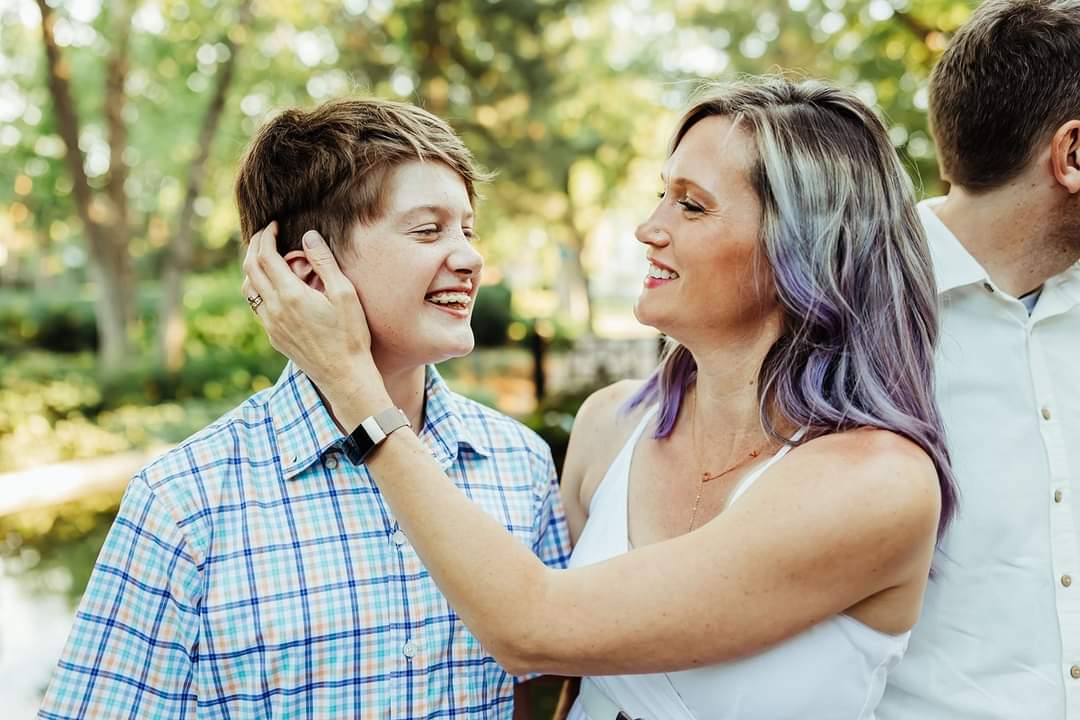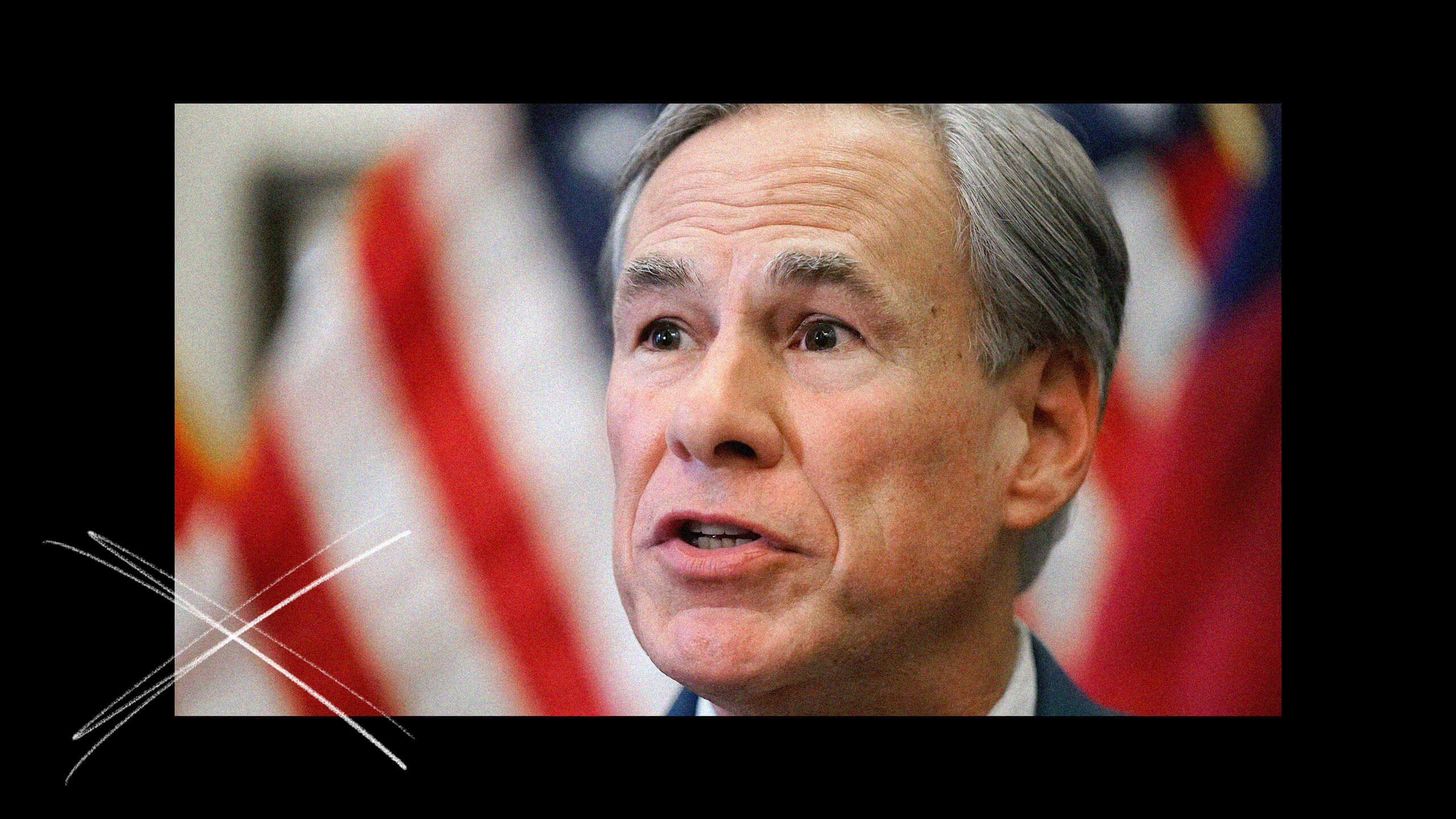This has been the worst year of Amber Briggle’s life, and what she worries about most is repeating it. In her home state of Texas, lawmakers proposed more than 70 bills targeting members of the LGBTQ2S+ community in 2021—including trans youth like her son, Max. Texas Gov. Greg Abbott signed a bill in October banning trans student athletes from playing on the school sports team that most closely aligns with their gender, while Republican legislators also pushed bills banning trans-affirming health care for minors and criminalizing parents who allow their kids to transition.
The last of these bills hit Briggle the hardest, and it still makes her the angriest when she thinks back on everything her family has been through. “When the Texas Legislature is debating whether or not to throw my husband and I in prison for 10 years and take our children from our safe, nonviolent, drug-free, loving home, it’s terrifying,” she tells Xtra over the phone. “I’ve lived a century this year.”
Because the Texas Legislature meets every other year, Briggle will have until 2023 to make preparations for the next legislative assault on her child’s right to exist. People often ask her why she doesn’t resolve the situation by moving her family to another state, but she is increasingly less sure about where she would go. At least 30 states proposed legislation targeting trans children in 2021, according to the advocacy group Freedom for All Americans, and even more are already drafting bills for the coming legislative session. Briggle is not optimistic about what the next year holds: “Just wait until 2022, and it’ll be all 50.”

Credit: Courtesy of Amber Briggle
Instead of uprooting her family just to wage the same battles somewhere else, Briggle is setting her sights on another fight: Texas’ gubernatorial contest. On Nov. 15, Democrat Beto O’Rourke announced plans to challenge Abbott, a second-term Republican, for the governor’s seat. In a video proclaiming his entry into the race, O’Rourke blasted “extremist policies” passed under Abbott, which includes the state’s controversial abortion bounty law, and vowed to focus on the issues most Texans “actually agree on,” such as decriminalizing marijuana and expanding Medicaid.
“It’s a really small vision for such a big state, but it doesn’t have to be that way,” he said. “I know that together we can get back to being big again.”
The campaign will be O’Rourke’s third in as many electoral cycles, following a near-miss bid for the U.S. Senate against Republican Ted Cruz in 2018 and a less successful presidential run in 2020. Initially seen as a frontrunner, the former Congressman came into the 2020 Democratic primaries with strong poll numbers—entering in third behind eventual winner Joe Biden and Vermont Senator Bernie Sanders—before his support steadily eroded in a crowded field. When O’Rourke announced on Nov. 1, 2020, that he was abandoning his bid, poll averages showed that just 2 percent of Democratic voters intended to back him for president.
Coming off the disappointment of 2020, O’Rourke will again face tough odds in Texas. Although Abbott is no longer one of America’s most popular governors and support for his re-election has slipped in recent months, the incumbent holds a significant advantage over his opponent. Abbott leads O’Rourke by an average of 5.4 percent in polls, although those numbers could shift following news that actor Matthew McConaughey, long expected to make his own gubernatorial bid, will not campaign in 2022.
“I will never forgive him or any of the Texas legislators who supported that bill, ever.”
Another challenge is Texas itself, which has not voted for a Democratic governor in three decades: Ann Richards, the state’s first and only female chief executive, served in the governor’s office for a single term from 1991 to 1995. She was ousted by a man who would become president in a few short years: George W. Bush, then the general managing partner for MLB outfit the Texas Rangers. He won by 7.6 points.
But Texas isn’t the same state it was when it boosted the presidential ambitions of a middling Yale student whose father happened to be a former commander-in-chief. The Lone Star State has shifted to the left in recent years, due in part to “leftugees” fleeing rising rents in states like California and New York. Of the 1.8 million new voters added to the rolls in 2020, the majority hailed from reliably liberal urban areas like Austin and Texas’ increasingly purple suburbs. Those demographic changes arguably showed in the 2020 results: incumbent Donald Trump earned the lowest share of votes of any Republican presidential candidate in Texas since Jimmy Carter won the state in 1976.
Briggle, for one, is ready to see the GOP relinquish its grip on the state after the party has controlled the Texas Senate, House and the governor’s seat since 2003. “To threaten to take my children away from me is unforgivable,” she says, pointing a finger directly at Abbott. “I will never forgive him or any of the Texas legislators who supported that bill, ever. There’s nothing they could ever do that could ever redeem themselves.”

Credit: Courtesy of Bekah Bryant
Other mama bears are equally fired up to change Texas’ political leadership, and many plan to campaign for O’Rourke directly. A term referring to mothers of trans youth that has been widely embraced by the community, “mama bears” are an extremely mobilized group, coming together in Facebook groups and text threads to organize protests against discriminatory legislation. Many say that fighting for their kids’ basic equality is itself a full-time job, on top of working and raising their children. When Bekah Bryant drove to the Texas Capitol in October to allow her eight-year-old daughter, Sunny, to testify before a House committee, it was a three-hour drive each direction.
“You usually have to book a hotel because you’re going to be there until two in the morning, and sometimes you have to book for two nights,” Bryant tells Xtra. She says, however, that she has developed a “great community of fellow advocates” through the half-dozen trips she has made to Austin over the past year: “It’s a financial burden but then these people that you have sat around for hours with every session, they’re your friends now. They understand what you’ve gone through.”
Among the tight-knit network of fellow mama bears that Bryant has built, many count themselves as longtime admirers of O’Rourke. Kimberly Shappley, the mother of 10-year-old Kai, says she “was just crushed” when he came up short against Cruz in the 2018 Senate race. When Texas pushed an ultimately unsuccessful anti-trans bathroom bill in 2015 and 2017, Cruz was a particularly vocal supporter of the effort. While mounting his own failed presidential bid in 2016, the senator claimed that allowing trans people to use the restroom of their choice is “opening the door for predators” and instead advised them to use the bathroom at home.
“I felt like, ‘Holy hell, I live in a state where the majority of people would rather vote for someone that is so hateful, horrible and useless than for this person who is genuinely kind,’” Shappley tells Xtra of watching as the Senate results came in. She pauses for a moment before adding of O’Rourke: “He’s in politics for all the right reasons.”

Credit: Courtesy of Kimberly Shappley
In contrast to both Cruz and Abbott, O’Rourke condemned the unprecedented spate of legislation targeting trans Texans in 2021. When the first iteration of the anti-trans sports bill, then known as SB-29, was brought before the Texas Senate State Affairs Committee in March, O’Rourke told lawmakers that he had been moved by the stories of trans youth who also spoke to the panel. One included Charlie Apple, a high school student from Corpus Christi who credited sports with helping him to build confidence and find his voice. “Sports saved my life,” Apple said earlier that day.
In his speech, O’Rourke credited the “grace, the patience and the generosity” of trans kids like Apple “for helping us to understand what their lives are like.” “It could not have been your intent, including the author of this bill, to hurt anybody,” he said to Senate committee members. “But now that you know that it will hurt people, I hope that you will withdraw this bill.”
O’Rourke’s address did not appear to sway the final vote. Republicans on the committee passed SB-29 anyway, although it would take an additional three special sessions of the legislature called by Abbott to force through the anti-trans sports bill. But even as the proverbial wrecking ball swung forward, O’Rourke’s speech offered something just as meaningful as blocking its path: proof that someone was listening. Many parents who stood with their children as they testified throughout the year say Republican legislators were frequently on their phones during the hearings.
“This is where I was born, and this is where I want to raise my kids… We don’t want to have to leave.”
If O’Rourke is elected, Bryant says she feels as if she could finally have a moment of rest instead of spending every spare second preparing for the worst. “We could take a breather and not have to worry about whether we’re going to have to move from our state,” she says. “This is where I was born, and this is where I want to raise my kids. This is where my mom, my meemaw, my brother and where our family is. We don’t want to have to leave.”
Some privately harbour concerns about whether O’Rourke can win in Texas after vowing to ban assault weapons during his presidential run, a position he continues to stand by. Indeed, polling indicates that the pledge could be a political liability: 49 percent of voters oppose making rifles like AR-15s and AK-47s illegal, while 40 percent support outlawing them.
The outcome of the election is still a year away, but mama bears say they intend to do what they do best: keep organizing. Briggle says she is already vowing to volunteer for O’Rourke’s campaign at the “earliest opportunity.” So much of her family’s life in Texas has been under the shadow of Abbott, who was elected to office the year before her son came out, that she says the very thought of his ousting fills her “with such profound relief” that she “almost can’t even express it.”
“I will be so delighted to see that spineless bully go home packing,” Briggle says, in an attempt to manifest her wish into reality. “After what he has put my family through, fuck him. Go away.”


 Why you can trust Xtra
Why you can trust Xtra


